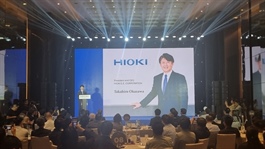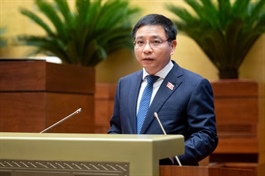Businesses backlash to e-commerce platforms collecting additional fees
Businesses backlash to e-commerce platforms collecting additional fees
Unlike familiar fees such as discounts, shipping or advertising fees, the "platform infrastructure fee" is a new charge applied by Shopee across the system.

Not only Shopee, many other e-commerce platforms such as Tiki and Lazada also have similar fees but with different names.— VNS Photo |
Small businesses and individual traders have reacted strongly after receiving notifications about the imposition of a 'platform infrastructure fee' of VNĐ3,000 (12 US cents) for each successful order on the e-commerce platform Shopee, effective from the beginning of this year.
Unlike familiar fees such as discounts, shipping or advertising fees, the 'platform infrastructure fee' is a new charge applied by Shopee across the system.
For each successful transaction order, VNĐ3,000 will be directly deducted from the seller. For small businesses, selling a few dozen orders per day, this amount can become a significant burden.
Trần Thị Hoa, the owner of a cosmetics stall, said that she processed around 50 orders per day.
If each order cost an additional VNĐ3,000, she would have to pay more than VNĐ4 million per month for infrastructure fees, not to mention other costs such as advertising, promotions and warehouse operations, she said.
Not only Shopee, but also many other e-commerce platforms such as Tiki and Lazada have similar fees under different names.
Although the names are different, the essence is that they are all additional costs that sellers must bear to maintain operations on the platform.
A noteworthy issue is that the implementation of this type of fee is mostly unilateral from the platform. Sellers are not consulted, have no right to refuse, and only become aware of the deduction when notified by the system or checking there revenue.
According to a survey by the Vietnam Consumers Protection Association, nearly 70 per cent of small businesses on e-commerce platforms said they did not clearly understand the nature of 'infrastructure fees', did not receive an accompanying contract, and were not given specific instructions.
The Thời báo Ngân hàng (The Banking Times) quoted lawyer Nguyễn Văn Lộc, Head of LPVN Law Firm, as saying that e-commerce platforms had the right to set service fees, but they must be transparent, clear and obtain the consent of the seller, who is the business partner, not the average consumer.
Unilateral fee collection without agreement might violate regulations on commercial contracts and the protection of traders' rights, he said.
Fair competition needed
Experts say that it is understandable that e-commerce platforms sought to diversify their revenue sources, especially when they have to maintain their operating systems, technology, logistics, and customer care.
However, the fee and method of collection must ensure harmony of interests, especially creating conditions for small businesses to survive in a fiercely competitive environment, experts advise.
Dr Nguyễn Thị Hằng, an expert at the Việt Nam Institute of Digital Economy Development, said that the platforms that are dominating the e-commerce market tended to impose policies unfavourable to sellers.
This could cause the e-commerce market to lose its fair competition, while creating barriers for new businesses, especially during the post-pandemic recovery period and when purchasing power remains weak, she said.
Many small traders also said that if fees continued to increase, they might withdraw from large platforms and switch to selling directly through social networks or other free platforms.
In response to the above shortcomings, a representative of the Vietnam E-Commerce and Digital Economy Agency under the Ministry of Industry and Trade, stated that it had received feedback from sellers about the new fee collection policy of Shopee and some other platforms.
The agency is currently reviewing the fee schedule and legal basis of the collections, and considering a proposal to build a mechanism to control the fee schedule of e-commerce platforms, said the representative.
Fee collection of e-commerce platforms is reasonable if there is a clear, transparent basis and consensus, according to the official.
However, if the fee is imposed, has not been made public, or abuses the platform's dominant market position, the authorities will intervene to handle it according to the Competition Law and related regulations.
In addition, experts suggest that it is necessary to build a separate legal framework for e-commerce platform fee schedules, similar to the price list of telecommunications or logistics services, to ensure market control and transparency.
- 07:16 30/06/2025























